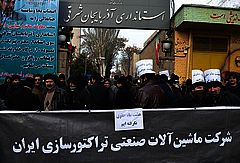New Year Holidays Ended With no Bonus for Workers
» Labor Protests Continue Into New Year
Iran’s labor community, which ended the Iranian calendar year of 1393 on March 20, 2015 in dismay because of the government’s decision just two weeks earlier to raise the minimum labor wage only to about $248 from $195, began the new year with no bonuses, shut workshops and plants, and judicial sentences against workers. A family’s expenses have been estimated at about $850 in the country.
As workers returned to work after the new year holidays, a group of 80 workers gathered in front of the Hegmataneh Petrochemical plant in Hamedan on April 5th to protest the one-month closure of the plant. Iran’s ILNA labor news organization attributed the closure to issues between shareholders and contractors of the company. Representatives of the employer had told workers that the company would not reopen till April 21st, prompting the workers to protest. According to ILNA workers have not till today been paid their usual new year bonuses. New year bonuses have been an unbroken tradition in Iran for all employees for generations.
Labor sources have said this is not the only company where salaries and bonuses have not been paid. Tabriz tractor-making company is another plant where some 270 workers have not been paid for last month’s wages in addition to new year bonuses. Some sources even said that the insurance benefits too had not been paid for a month at the plant.
The website of independent Etehadie Azad Kargaran Iran (Free Workers Union of Iran) labor association says that workers at the Navard pipe production company continued their strike into the new year and refrained from returning to work on April 4, the first day of work after the holidays, to continue their demands for their unpaid salaries. The website said that the workers had not received the customary bonuses for the new year either.
But the most widespread and loudest complaint of workers are the amounts of minimum wages which they argue are determined in disregard to the rising living expenses and the recommendations of labor representatives.
Protests over the minimum wage continued as soon as workers returned to work after the new year holidays or when plants and workshops reopened. When the new wage standards were announced, the Etehadie Azad Kargaran denounced the increase and ridiculed the government, issuing a threat that “workers and teachers would protest in waves” in the coming year.
In addition to the disproportionate minimum wages, workers also have been facing dismissals, the closure of production plants, discriminate wages, and even prison sentences, including whipping of protesting workers.
An example of court rulings against workers is a sentence against five workers at the Chadormaloo mine each of whom received a one year sentence. The workers were charged with disruption of public order, but workers have said that they were seen as leaders of the strikers by the employer and were sentenced to teach the other workers a lesson to stay away from such activities.
A year earlier, some 16 employees of Kushk mine in the town of Bafgh were fired from their work because of their participation in and organization of protests.



